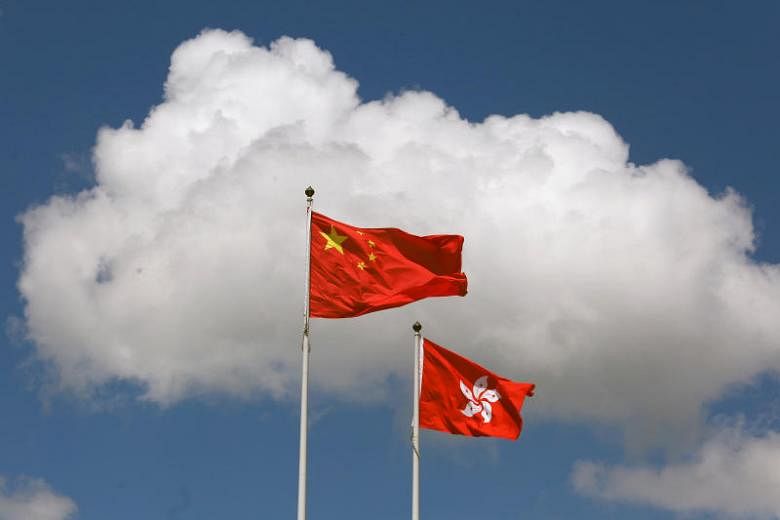HONG KONG (CHINA DAILY/ASIA NEWS NETWORK) - Hong Kong is no longer China's gateway to the rest of the world. This statement is not a negative comment - it just reflects the new situation of the country's development and highlights the importance of re-positioning Hong Kong.
President Xi Jinping said when opening the Boao Forum for Asia on Tuesday that China will open its doors "wider and wider" to foreign investors. One concrete measure is the removal of caps on foreign equity in banks, securities firms and insurance companies by the end of this year, as had been promised earlier.
Over the years, Hong Kong has successfully played a unique role as China's gateway to the outside world when the Chinese mainland still tightly restricted market access. However, with the mainland accelerating its opening-up and removing more and more restrictions on foreign investment, Hong Kong's gateway role becomes less and less significant.
Times change.
Making sense of the timing of Xi's speech is essential.
There are three points to be noted. Firstly, the annual Boao Forum is Xi's first opportunity for home-court diplomacy since his unanimous re-election as the president, beginning his second term in office.
Secondly, the United States has proposed tariffs on Chinese goods and trade tensions between the world's two biggest economies have rarely been higher.
Thirdly and most importantly, China - the world's second-largest economy - is at a critical stage of advancing and deepening the reform and opening-up process launched 40 years ago.
Given these circumstances, Xi, on behalf of China, gave the world a clear message as to how China is going to respond to the new era of globalisation, as well as grave uncertainties brought by growing protectionism.
To adapt to the change, Hong Kong people need to recognise the reality and adjust. We should further open to the world and move closer to the mainland. We should put more efforts into changing the city's role and try to become the new role model for the nation.
So far, local commentators have offered two opposing arguments about Hong Kong's role as the country further opens up.
One is quite pessimistic, suggesting Hong Kong is losing its significance; and the other one is slightly confident, arguing Hong Kong can still play the gateway role as the country is unlikely to open completely in all economic aspects over a short time span.
However, there should be a third perspective - a neutral and objective one.
If Hong Kong can fully understand the vision and mission of Beijing, we will realise that it is a golden opportunity for Hong Kong to change its role from a "gateway" to "platform".
Last year Xi defended globalisation at the World Economic Forum in Davos, Switzerland.
Earlier this year Liu He - who led the Chinese delegation - told the WEF that China's market liberalisation efforts this year would exceed the expectations of the global community.
Xi's Boao speech can be read as China's answer to the WEF, as well as presenting to the audience in Hainan the vision for China's place in the new world order, trying to sooth worries about the nation's rise and stressing its emphasis on peaceful development.
Xi emphasised that the world had become a global village and any country that closed itself up would go against historical trends. In this global village, China would proactively develop global partnerships and firmly support multilateralism for the sake of a community of shared destiny for humanity.
It is important for Hong Kong to think about what we can do with such a great plan. Instead of a "gateway", we can become a "platform" for globalisation.
A general plan for the Guangdong-Hong Kong-Macao Greater Bay Area project is going to be released soon.
Just as Chief Executive Carrie Lam Cheng Yuet-ngor said at Boao: "The principle of 'one country, two systems' is itself an innovation to become a unique advantage of the Bay Area."
The point is that Hong Kong can provide an innovative institutional design for the Bay Area to facilitate the flow of people, goods, capital and information and attract talented professionals.
Ma Xingrui, governor of Guangdong province who also attended the forum, said Guangdong would enhance cooperation with Hong Kong authorities and focus on removing obstacles to collaboration between the two systems.
It is expected the Lok Ma Chau Loop Innovation and Technology Park can be a groundbreaker in such innovation.
The stars have changed position.
Stephen Hawking taught us: "Look up at the stars and not down at your feet. Try to make sense of what you see, and wonder about what makes the universe exist."
And: "Intelligence is the ability to adapt to change."
To adapt to the change, Hong Kong people need to recognise the reality and adjust.
We should further open to the world and move closer to the mainland. We should put more efforts into changing the city's role and try to become the new role model for the nation.
The author is research officer of the One Country Two Systems Research Institute. China Daily is a member of The Straits Times media partner Asia News Network, an alliance of 23 news media entities.

